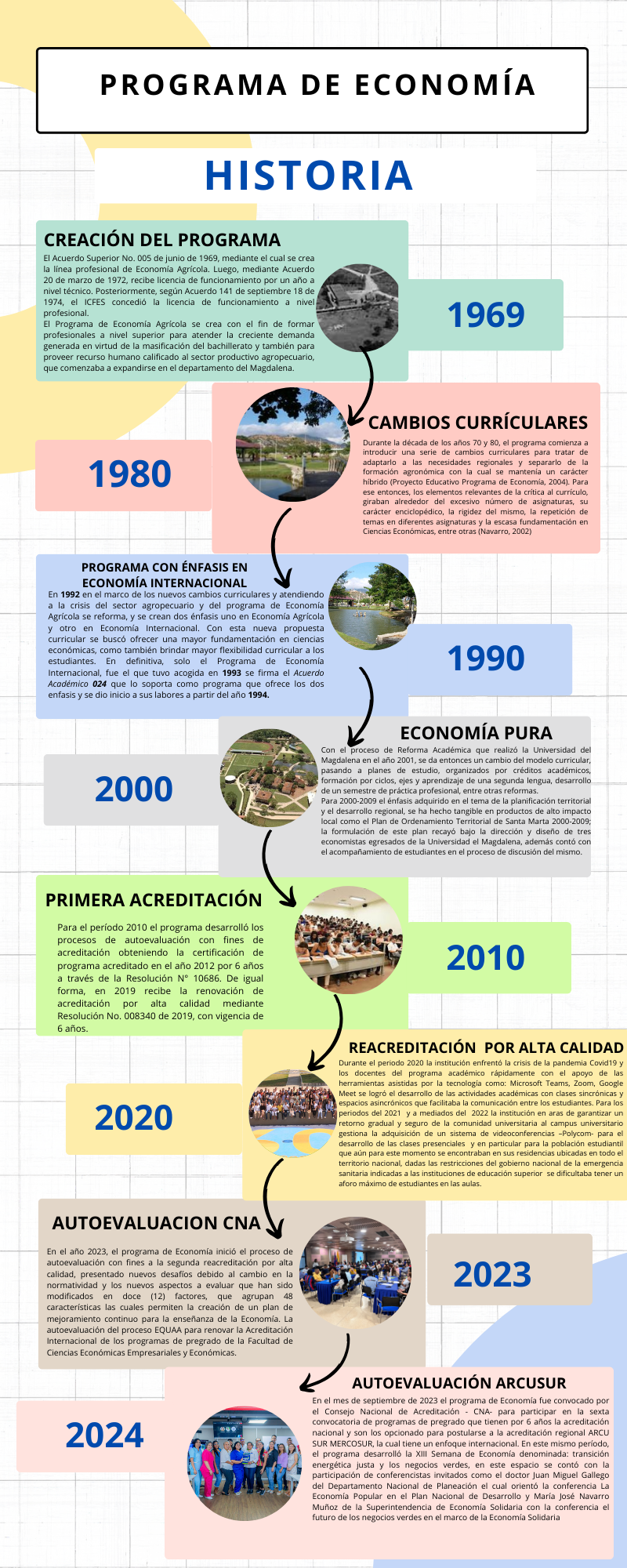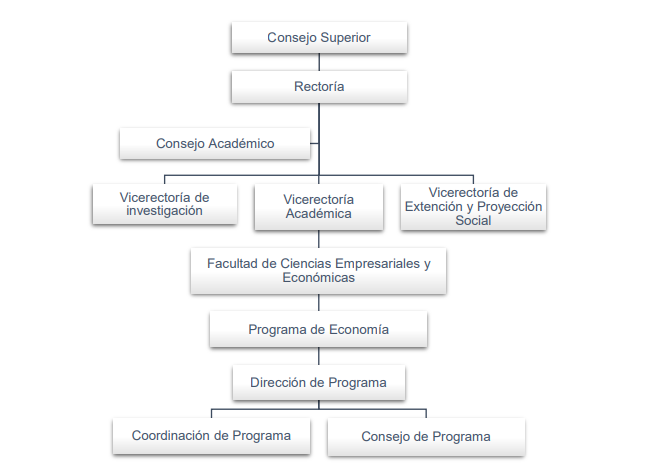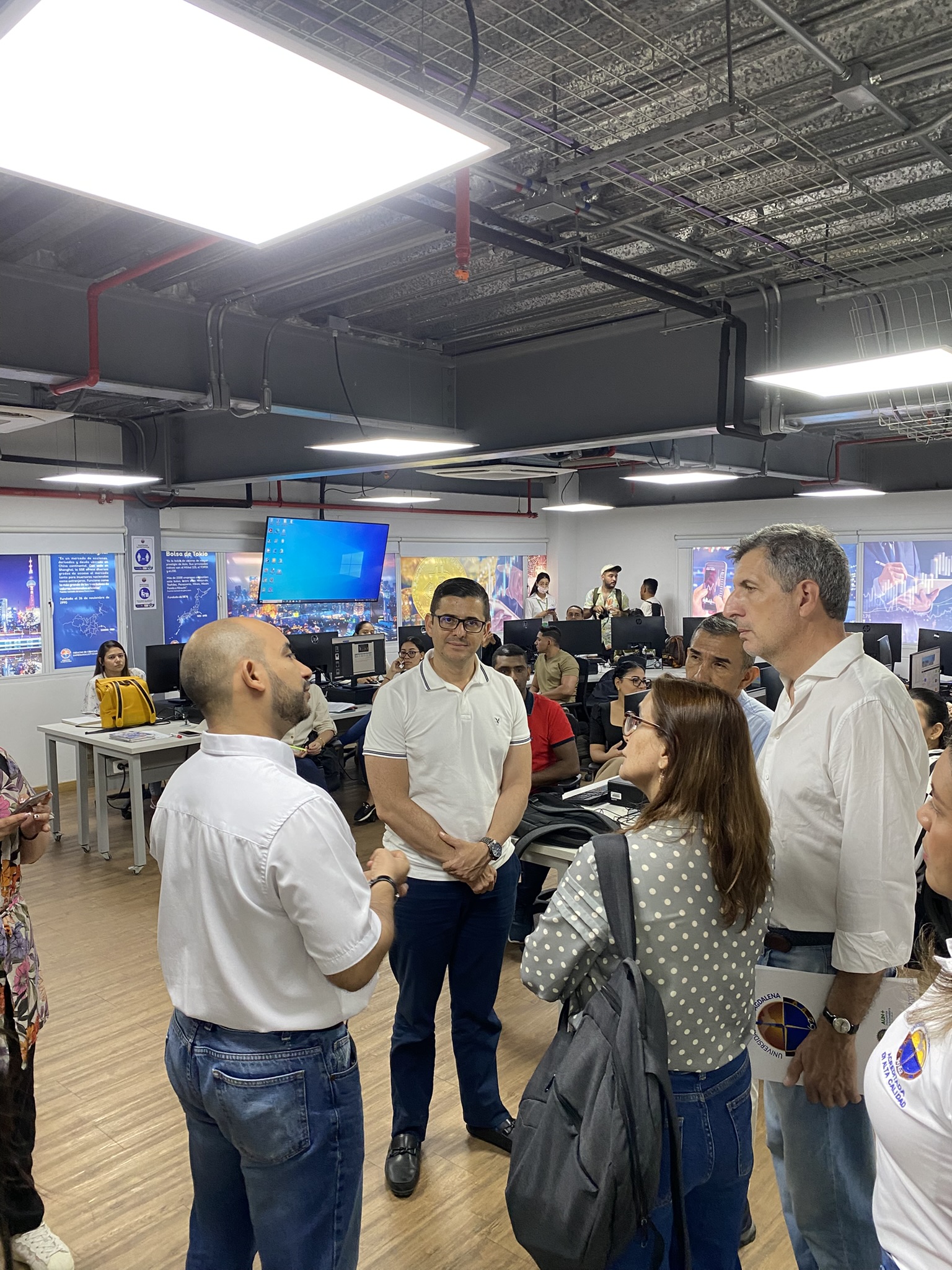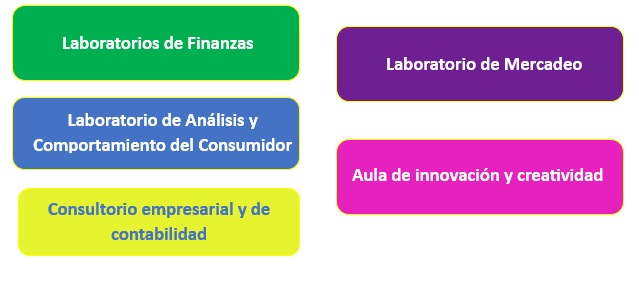Misión
Contribuir al desarrollo socioeconómico de la Región Caribe y el país, mediante la formación integral y flexible de economistas de alta calidad profesional y ética, reconocidos por sus competencias académicas, la rigurosa fundamentación en teoría económica, el dominio de técnicas y herramientas cuantitativas y cualitativas y, competencias en el dominio en una segunda lengua, y por la capacidad de liderar la creación y transformación innovadora de las organizaciones y la sociedad donde interactúa con una visión competitiva, sostenible y social a través de un diálogo constante con las comunidades en los territorios.
Visión
Para el año 2030 el programa de Economía será reconocido nacional e internacionalmente por su compromiso con:
- Su calidad académica respaldada por el posicionamiento de sus egresados y alta cualificación docente,
- Su modelo de formación flexible en innovadora,
- Su liderazgo en la Región Caribe en la búsqueda de posibles soluciones de las problemáticas bajo un enfoque inter y transdisciplinar, la sostenibilidad que contribuyan al mejoramiento de la calidad de vida las comunidades.
Historia
En los años 70 y 80, el programa comienza a introducir cambios curriculares para adaptarlo a las necesidades regionales y separarlo de la formación agronómica con la que se mantenía un carácter híbrido (Proyecto Educativo Programa de Economía, 2004). Para ese entonces, los elementos relevantes de la crítica al currículo giraban alrededor del excesivo número de asignaturas, su carácter enciclopedístico, la rigidez de este, la repetición de temas en diferentes asignaturas y la escasa fundamentación en Ciencias Económicas, entre otras (Navarro, 2002).
En 1992 en el marco de los nuevos cambios curriculares y atendiendo a la crisis del sector agropecuario y del programa de Economía Agrícola se reforma, y se crean dos énfasis uno en Economía Agrícola y otro en Economía Internacional. Con esta nueva propuesta curricular se buscó ofrecer una mayor fundamentación en Ciencias Económicas, como también brindar mayor flexibilidad curricular a los estudiantes. En definitiva, solo el Programa de Economía Internacional, fue el que tuvo acogida y se iniciaron sus labores a partir del año 1994.
El plan de estudio del Programa de Economía con énfasis en Economía Internacional, si bien redujo el número de cursos y el carácter enciclopedístico, heredó algunas debilidades de los planes anteriores relacionadas con la poca flexibilidad curricular por cuenta de los excesivos prerrequisitos y correquisitos en las asignaturas y la escasa fundamentación en teoría económica, en especial en áreas como macroeconomía, microeconomía.
Con el proceso de Reforma Académica que realizó la Universidad del Magdalena en el año 2001, se da entonces un cambio del modelo curricular, pasando a planes de estudio, organizados por créditos académicos, formación por ciclos, ejes y aprendizaje de una segunda lengua, desarrollo de un semestre de práctica profesional, entre otras reformas. Para 2000-2009, el énfasis sobre la planificación territorial y el desarrollo regional se ha hecho tangible en productos de alto impacto local como el Plan de Ordenamiento Territorial de Santa Marta 2000-2009; la formulación del plan recayó bajo la dirección y diseño de tres economistas graduados de la Universidad el Magdalena, acompañados por estudiantes en la discusión del mismo.
El Programa se vinculó activamente en todas las actividades concernientes a la formulación del Plan Estratégico Exportador de Santa Marta y el Magdalena, integrando las mesas del CARCE (Comité Asesor Regional de Comercio Exterior), para impulsar la cultura exportadora. En esta materia los graduados del Programa de Economía con énfasis en Economía Internacional logran insertarse en proyectos como Expopyme, en el cual se vinculan a las Pymes de la ciudad para apoyar su gestión empresarial enfocada hacia la exportación.
Por otro lado, para el período 2009-2011 el programa desarrolla los procesos de autoevaluación con fines de acreditación obteniendo la certificación de programa Acreditado por Alta Calidad en el año 2012 por 6 años. Desde entonces el programa de Economía ha avanzado en las actividades contempladas en el plan de mejora, en las recomendaciones del Ministerio de Educación Nacional y en el fortalecimiento de procesos que contribuyen a la formación del profesional en Economía.
Después de mucho esfuerzo el programa consigue la Resolución de Acreditación por alta calidad el 6 de septiembre del año 2012, con vigencia de seis años. El mismo año se logra el Registro Calificado otorgado por la Resolución 12934 del 10 de octubre de 2012 del Ministerio de Educación Nacional con vigencia de siete años.
Dentro los avances para el manejo de datos y el enriquecimiento del programa se realizó un convenio con el Departamento Nacional de Estadísticas, (DANE) en noviembre del 2017. Por el cual, se instauró un espacio en la facultad de ciencias empresariales y económicas, donde estaban los equipos del Centro de datos DANE, y toda la comunidad universitaria podía usar esta instalación para fortalecer los datos e indicadores que usen en sus investigaciones. Desde entonces se realizan capacitaciones del manejo de los datos y se puede acceder a las diferentes encuestas integradas realizadas a nivel nacional. En el período 2023 se solicitó al DANE para actualizar el memorando de entendimiento y obtener la renovación, uso y licencia de las bases de datos para investigación y académicos.
Para el período 2009 el programa desarrolló los procesos de autoevaluación con fines de acreditación obteniendo la certificación de programa acreditado en el año 2012 por 6 años a través de la Resolución N° 10686. De igual forma, en 2019 recibe la renovación de acreditación por alta calidad mediante Resolución No. 008340 de 2019, con vigencia de 6 años.
En el año 2020 el Programa de Economía firmó Acuerdo Marco y Específico con el Banco de Desarrollo de América Latina – CAF, convirtiéndose en la primera Universidad pública en Colombia en formalizar esta alianza, que dejó buenos resultados en relación con la producción intelectual e investigación del programa.
El programa a partir de este nuevo proceso de autoevaluación se plantea como retos continuar en la formación de economistas competitivos que continúen respondiendo a las necesidades del entorno, al desarrollo territorial y a las apuestas estratégicas y futuras del orden institucional, regional, nacional e internacional.
En 2019 el Ministerio de Educción Nacional (MEN) emitió el Decreto 1330 para regular los procesos de registro calificado y calidad académica de las Instituciones de Educación Superior (IES) y fortalecer la visión de calidad que responda a las demandas del contexto nacional e internacional. Los resultados de aprendizaje son uno de los elementos importantes contemplados en el Decreto que conceptualizó el Consejo Nacional de Educación Superior CESU mediante su Acuerdo 02 de 2020.
El Programa de Economía, acorde a lo establecido en la actualización del modelo de acreditación del CESU y basados en las apuestas de mejoramiento de la calidad contempladas en el Plan de Desarrollo Universitario 2030 “Unimagdalena Comprometida” y la apuesta estratégica de la Facultad de Ciencias Empresariales y Económicas en mejorar las condiciones de calidad de los programas académicos, propone la definición de los resultados de aprendizaje que el Economista de la Universidad del Magdalena deberá alcanzar al finalizar su proceso de formación académica.
Para la definición de resultaos de aprendizaje se tomó como referencia la metodología propuesta por el docente Alexander Tobón (2019) en su texto: “Diseño e implementación de resultados de aprendizaje para pregrados de economía”. Este documento se propone como guía orientativa para que los docentes del Programa inicien la definición de los resultados de aprendizaje en cada curso que orienta. Para ello, se han tomado como modelo las asignaturas definidas en el área de formación básica disciplinar expresa en el Plan de Estudios (Acuerdo Académico 035 de 2011).
Durante el periodo 2020 – 1 la institución enfrentó la crisis de la pandemia Covid 19 y los docentes del programa académico rápidamente con el apoyo de las herramientas asistidas por la tecnología como: Microsoft Teams, Zoom, Google Meet se logró el desarrollo de las actividades académicas con clases sincrónicas y espacios asincrónicos que facilitaba la comunicación entre los estudiantes. Para el periodo 2020-2 la situación continua igual con la pandemia Covid 19, sin embargo, para este momento los docentes del programa en el periodo intersemestral o de vacaciones mejoraron las habilidades tecnológicas enfocadas en la preparación de los contenidos de clases. En consecuencia, la institución dispone el equipo del Centro de Tecnologías Educativas y Pedagógicas – CETEP- y Bloque 10 para el acompañamiento a los docentes en talleres en uso de teams, potcads, you tube, brightspace, entre otras herramientas virtuales para apoyar la labor del docente.
Para los periodos del 2021 y a mediados del 2022 la institución en aras de garantizar un retorno gradual y seguro de la comunidad universitaria al campus universitario gestiona la adquisición de un sistema de videoconferencias –Polycom- para el desarrollo de las clases presenciales y en particular para la población estudiantil que aún para este momento se encontraban en sus residencias ubicadas en todo el territorio nacional, dadas las restricciones del gobierno nacional de la emergencia sanitaria indicadas a las instituciones de educación superior se dificultaba tener un aforo máximo de estudiantes en las aulas.
En el año 2023, el programa de Economía inició el proceso de autoevaluación con fines a la segunda reacreditación por alta calidad, presentado nuevos desafíos debido al cambio en la normatividad y los nuevos aspectos a evaluar que han sido modificados en doce (12) factores, que agrupan 48 características las cuales permiten la creación de un plan de mejoramiento continuo para la enseñanza de la Economía. La autoevaluación del proceso EQUAA para renovar la Acreditación Internacional de los programas de pregrado de la Facultad de Ciencias Económicas Empresariales y Económicas.
En septiembre de 2023 el programa de Economía lo convocó el Consejo Nacional de Acreditación -CNA- para participar en la sexta convocatoria de programas de pregrado por cumplir con el requisito de programa acreditado en alta calidad por 6 años a nivel nacional se podían postularse a la acreditación regional ARCU SUR MERCOSUR. En consecuencia, la indicación del CNA es que se cuenta con el aval para continuar con las etapas de la convocatoria.
En este mismo período, el programa desarrolló la XIII Semana de Economía denominada: transición energética justa y los negocios verdes, en este espacio se contó con la participación de conferencistas invitados como el doctor Juan Miguel Gallego del Departamento Nacional de Planeación el cual orientó la conferencia La Economía Popular en el Plan Nacional de Desarrollo y María José Navarro Muñoz de la Superintendencia de Economía Solidaria con la conferencia el futuro de los negocios verdes en el marco de la Economía Solidaria. El semillero de transición energética apoyó en un conversatorio interdisciplinario sobre ¿cómo vivimos y se proyecta la transición energética en el Magdalena?, estudiantes de los programas de pregrado de: Economía, Derecho, Antropología, y programas de posgrados como la Maestría en Antropología de la Universidad del Magdalena.
Siguiendo con las jornadas de actualización y dada la importancia que tienen el cuerpo profesoral en el programa de Economía se logró la realización de un Taller de Evaluación de Resultados de Aprendizaje con el fin de generar espacios de capacitaciones y reflexiones del quehacer entre docentes, para este encuentro se contó con la participación de un docente invitado de la Universidad de Antioquía Alexander Tobón Arias, PhD en Economía Aplicada, en este taller se tuvo la oportunidad de revisar los resultados de aprendizaje declarados por el programa de Economía en el 2021 y del que resultaron observaciones y/o recomendaciones del experto.
El programa de Economía sigue avanzando en diferentes aspectos como mejorar la calidad de los procesos académicos, administrativos, de extensión e investigación a fin de que mantener estándares y que la comunidad este satisfecha con los servicios ofrecidos; también se busca que los estudiantes mejoren las competencias y las habilidades personales, científicas, sociales, culturales, entre otras y se impacte positivamente en la vida de ellos. También se avanza en temas de internacionalización desde el currículo, la incorporación de la segunda lengua en el contenido curricular a través de los cursos de electivas libres. Los estudiantes desarrollan las habilidades en emprendimiento y la innovación con los programas del Centro de Emprendimiento e Innovación de la universidad. En consecuencia, con las diferentes modalidades de grado los estudiantes pueden optar a programas de posgrado mediante créditos académicos en los cursos de posgrados de la institución y aprovechar los beneficios y descuentos en matriculas.
Finalmente, el programa se proyecta a 2030 fortalecido en: procesos de autoevaluación y re-acreditado nacional e internacionalmente, con una amplia infraestructura física y tecnológica, con una planta de docente cualificados, uso de tecnología adaptada en los cursos, uso de analítica de datos, movilidad académica con Centros de Investigación Internacional y con convenios internacionales para incrementar la movilidad de estudiantes y docentes.
Rendición de cuentas
La rendición de cuentas del Programa de Economía 2025 se erige como un ejercicio de transparencia y compromiso institucional que refleja la consolidación de metas estratégicas orientadas a la excelencia académica y la pertinencia social.
Este informe no solo expone los avances logrados en procesos clave como la autoevaluación para la acreditación de alta calidad, la reforma integral del plan de estudios y la preparación para las pruebas Saber Pro, sino que también evidencia la apuesta por la internacionalización, la interdisciplinariedad y la generación de espacios de reflexión sobre problemáticas nacionales que impactan la región Caribe. Cada acción ejecutada durante el periodo constituye un paso firme hacia la transformación del conocimiento en soluciones concretas para el desarrollo territorial, reafirmando la vocación incluyente e innovadora que caracteriza a nuestra Facultad.
Con esta rendición, invitamos a la comunidad académica y al sector productivo a conocer los resultados alcanzados y a sumarse a los desafíos que proyectamos para el 2026, en un escenario donde la calidad y la pertinencia son pilares inquebrantables.
Organigrama
Acreditación
Programa de Economía de UNIMAGDALENA recibe Reacreditación en Alta Calidad por seis años más
El Programa de Economía de la Universidad del Magdalena continúa consolidándose como uno de los referentes académicos más importantes de la Región Caribe y del país. El Ministerio de Educación Nacional, acogiéndose al concepto emitido por el Consejo Nacional de Acreditación – CNA, otorgó al programa la renovación de la Acreditación en Alta Calidad por seis (6) años y, de manera simultánea, la renovación de oficio del Registro Calificado por siete (7) años, según la Resolución No. 019909 del 2 de octubre de 2025. (MEN, 2025)
Una trayectoria histórica de calidad y transformación
El Programa de Economía de UNIMAGDALENA, creado en 1969 y con una amplia tradición académica, ha experimentado una evolución significativa desde sus inicios como Economía Agrícola. Su transformación curricular —descrita en detalle en su Proyecto Educativo de Programa (PEP) 2023— demuestra una apuesta institucional por la excelencia, la pertinencia social y la innovación académica
Durante las décadas de 1970 y 1980, el programa inició un proceso de modernización y fortalecimiento disciplinar que permitió superar modelos rígidos y enciclopedistas. En los años noventa evolucionó hacia un enfoque en Economía Internacional, ampliando la fundamentación en teoría económica, métodos cuantitativos y análisis macro y microeconómico.
A partir de 2001, con la Reforma Académica institucional, el programa adoptó un currículo por créditos académicos, promoviendo flexibilidad, interdisciplinariedad, segunda lengua, movilidad académica y práctica profesional.
Estos avances permitieron que el Programa de Economía alcanzara por primera vez la Acreditación en Alta Calidad en 2012 por seis años, y posteriormente la renovación en 2019, también por seis años, logros reflejados en su PEP y en sus procesos permanentes de autoevaluación.
Un nuevo reconocimiento que fortalece su liderazgo regional y nacional
La reciente Resolución 019909 resalta que el CNA emitió concepto favorable tras analizar el informe de autoevaluación del programa, presentado el 26 de julio de 2024, y luego de la sesión de evaluación desarrollada en mayo de 2025.
En su decisión, el Ministerio destaca que el Programa de Economía cumple con las condiciones de alta calidad académica, la consolidación de un cuerpo docente cualificado, los avances en investigación, la flexibilidad curricular y el impacto en el desarrollo regional.
El acto administrativo determina:
-
Renovar la Acreditación en Alta Calidad por seis (6) años para el Programa de Economía, modalidad presencial, sede Santa Marta.
-
Renovar de oficio el Registro Calificado por siete (7) años, de acuerdo con la normativa vigente.
-
Ordenar la actualización de la información en el Sistema Nacional de Información de la Educación Superior – SNIES.
Este logro reafirma el compromiso institucional de UNIMAGDALENA con la excelencia y refleja la consolidación de un ecosistema académico que articula docencia, investigación, proyección social, internacionalización y uso de tecnologías para la formación de economistas íntegros, críticos y comprometidos con el desarrollo territorial.
Apuesta hacia 2030: una visión internacional e innovadora
El PEP 2023 proyecta que para el año 2030 el Programa de Economía será reconocido nacional e internacionalmente por su calidad académica, su modelo formativo flexible e innovador, su liderazgo en la comprensión y solución de problemáticas socioeconómicas y su capacidad de impactar positivamente en comunidades y territorios, (PEP, 2023)
Con la renovación de la acreditación, el programa reafirma esta ruta estratégica de crecimiento, fortaleciendo alianzas académicas, fomentando la movilidad, potenciando el análisis económico aplicado y promoviendo la formación integral de sus estudiantes.
Normatividad
Nuestro programa de economía cuenta con un registro calificado No. 016203 vigente con fecha de 18 diciembre 2019.
Así contamos con los siguientes documentos de suma importancia que es muy necesario que conozcas.
Laboratorios
La Universidad del Magdalena es un referente de la Región Caribe por la armonía entre sus espacios verdes y la infraestructura física, su sede principal se localiza en la ciudad de Santa Marta, capital del departamento de Magdalena.
Asimismo, posee uno de los campus universitarios más grandes de la región, con un área de aproximadamente de 47,5 Ha. Todos los que en ella convergen encuentran un espacio equipado con la tecnología necesaria para desarrollar las actividades académicas, recreativas, deportivas, culturales, interactuando con el ambiente y las diversas especies de fauna y flora que habitan dentro del campus.
El campus universitario en sí se considera como un laboratorio abierto debido a su variedad de fauna y flora distribuidas en amplias zonas verdes, lagos y zonas de bosque para el desarrollo de diversas experiencias prácticas de acuerdo con las necesidades de los programas.
Para el 2022 la institución aumentó su área construida destinada a actividades de docencia y bienestar en 27.745 m2, que incluyen espacios académicos que cuentan con una cobertura del 100% en dotación de ayudas audiovisuales, sistemas de aires acondicionados de última tecnología ahorradores de energía y amigables con el medio ambiente.
Desde el 2014 se han adecuado y modernizado 5 salas generales de cómputo e informática y laboratorios como el de Animación y Postproducción Audiovisual, Tecnologías de la información, Sistemas Operativos, Aplicaciones informáticas para el programa de Economía los estudiantes y docentes.
En 2018 se construyeron en el edificio del Centro de innovación y emprendimiento (Edificio modular) donde se cuenta con diferentes áreas tales como:
Objetivos educativos del programa
Objetivos del programa
Objetivo general
Formar profesionales con una sólida fundamentación en Economía dotado de conocimientos teóricos, técnicos e instrumentales y en valores que le confieren integridad moral y sensibilidad social, capaces de identificar y proponer soluciones a los problemas que enfrenten en el ejercicio de la profesión.
Objetivos específicos
- Ofrecer bases sólidas de formación en teoría y política económica, para la comprensión del funcionamiento de la economía y los mercados, en los ámbitos micro y macroeconómicos y comprender el manejo de los instrumentos de política económica.
- Potenciar la capacidad de análisis económico para la comprensión y solución de problemas del desarrollo en múltiples ámbitos.
- Generar habilidades para el empleo de métodos formales, técnicas econométricas y herramientas cuantitativas que le permitan el análisis y manejo de datos, el contraste empírico de hipótesis, el pronóstico, la modelación y formalización de fenómenos económicos y manejar los avances científicos aplicados en su área de estudio.
- Identificar y comprender los aportes de las distintas corrientes de pensamiento económico, y conocer los postulados de los principales pensadores, así como, sus aportes más significativos a la teoría económica.
- Brindar las herramientas metodológicas para el análisis riguroso de los hechos históricos y acontecimientos económicos contemporáneos, que faciliten la comprensión de la evolución de la sociedad, sus principales dinámicas, ciclos y transformaciones.
- Propender por el desarrollo de competencias para la planificación, administración y gestión de procesos de distinto orden, fomentando la integración de las ciencias particulares en la solución de problemas reales en las organizaciones, racionalizando recursos disciplinarios, para que así la integración disciplinar se nutra y proyecte en la realidad.
- Desarrollar habilidades de comprensión de lectura que le permitan al estudiante interpretar textos en ingles de carácter general y de literatura especializada.
- Contribuir a la formación integral de profesionales con alta sensibilidad social, respaldada por su sentido cívico, ético, de respeto por el medio ambiente y la diversidad cultural; que faciliten su interacción creativa y competitiva en contextos globales.
Resultados del estudiante
Resultados del Aprendizaje
En el año 2019 el Ministerio de Educción Nacional (MEN) emitió el Decreto 1330 con el objetivo de regular los procesos de registro calificado y calidad académica de las Instituciones de Educación Superior (IES) y fortalecer la visión de calidad que responda a las diversas demandas del contexto nacional e internacional. Los resultados de aprendizaje se convierten de uno de los elementos importantes contemplados en el Decreto que, posteriormente, es conceptualizado por Consejo Nacional de Educación
Superior CESU a través de su Acuerdo 02 del año 2020.
El Programa de Economía, acorde a lo establecido en la actualización del modelo de acreditación del CESU y basados en las apuestas de mejoramiento de la calidad contempladas en el Plan de Desarrollo Universitario 2030 “Unimagdalena Comprometida”
y la apuesta estratégica de la Facultad de Ciencias Empresariales y Económicas en mejorar las condiciones de calidad de los programas académicos, propone la definición de los resultados de aprendizaje que el Economista de la Universidad del Magdalena deberá alcanzar al finalizar su proceso de formación académica.
Para la definición de resultados de aprendizaje se tomó como referencia la metodología propuesta por el docente Alexander Tobón (2019) en su texto: “Diseño e implementación de resultados de aprendizaje para pregrados de economía”. En este sentido, el presente documento se propone como una guía orientativa para que los docentes del Programa inicien el proceso de definición de dichos resultados de aprendizajes en cada uno de los cursos que orientan. Para tal fin, se han tomado como modelo las asignaturas que se encuentran definidos en el área de formación básica disciplinar expresa en el Plan de Estudios (Acuerdo Académico 035 de 2011).
RA1: Contrasta los diferentes postulados del conocimiento económico con las realidades en contextos reales a nivel multiescalar.
RA2: Deduce los razonamientos que componen el conocimiento económico para aproximarse a las posibles soluciones.
RA3: Analiza las diferentes situaciones problemáticas socioeconómicas y ambientales utilizando como soporte los postulados del conocimiento económico y las herramientas técnicas cualitativas y cuantitativas.
RA4: Aplica el conocimiento económico en diferentes contextos haciendo uso de herramientas técnicas cualitativas y cuantitativas.
RA5: Propone soluciones a los diferentes problemas existentes en el territorio utilizando los postulados económicos y las herramientas cuantitativas y cualitativas.






